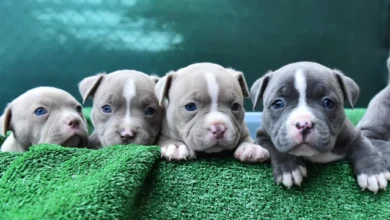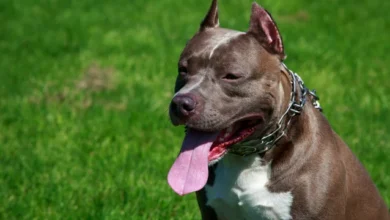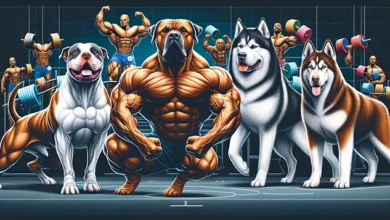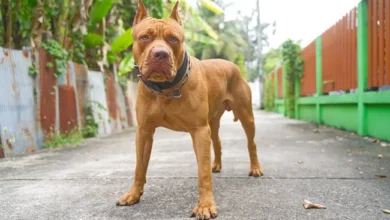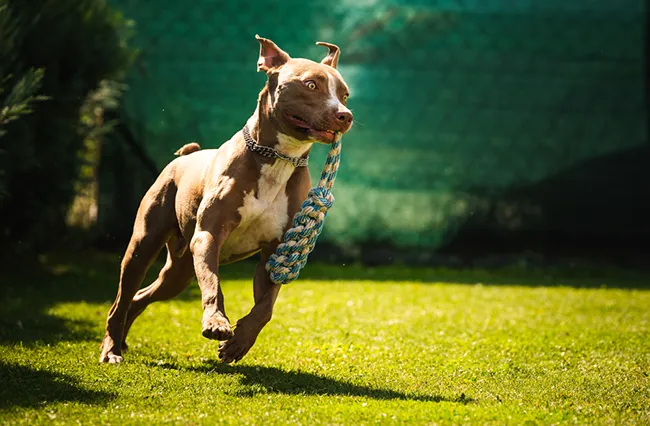
Some dogs boast such impressive muscles that you might mistake them for four-legged bodybuilders, and among them, Pit Bulls stand out. These canine companions possess remarkable strength and a robust physique, making them contenders in the imaginary world of doggy bodybuilding competitions. With their powerful build and undeniable athleticism, Pit Bulls exemplify the potential for canine muscle mastery. Let’s delve into what makes these dogs stand tall in the realm of muscular prowess.
3 Reasons Why Pit Bulls Are So Muscular
Pit Bulls are naturally muscular due to their genetic makeup. Specifically, breeds like the American Pit Bull Terrier were originally developed by breeding active dogs like terriers and bulldogs. Unfortunately, their historical roles involved activities like fighting and bull-baiting, where a strong and powerful physique was crucial. Despite this, today, some breeders focus on more humane sports such as weight pulling and dock jumping. The inherent genetic predisposition of Pit Bulls makes them prone to being active and enjoying sports, ultimately contributing to their muscular build. In essence, their genes play a significant role in shaping their robust and muscular stature.
Here are some factors that contribute to the robust physique of these affectionate giants when compared to other dog breeds known for their family-friendly nature:
1. Genetic
The genetic foundation of the Pit Bull breed significantly influences their muscular build. These dogs, particularly the American Pit Bull Terrier, inherit traits from a lineage carefully crafted for strength and agility. The breeding history involves active and muscular breeds such as terriers and bulldogs. Unfortunately, the original purpose, rooted in activities like bull-baiting and fighting, emphasized the need for a powerful physique. Over time, while some breeding practices have shifted towards more humane activities, the genetic predisposition for muscle development remains. In essence, the muscular build of Pit Bulls is deeply ingrained in their genes, a testament to their historical roles and carefully curated lineage.
2. Muscle Fiber Composition
Pitbulls exhibit a fascinating muscular fiber composition, primarily characterized by the prevalence of fast-twitch (type 2) and slow-twitch (type 1) fibers. Fast-twitch fibers, known for their quick contraction and explosive power generation, play a significant role in the Pitbull’s strength and agility. In contrast, slow-twitch fibers sustain muscle contractions for extended periods. The distinctive feature of Pitbulls lies in the higher proportion of fast-twitch muscles within their muscular makeup. This abundance of fast-twitch muscle fibers equips them with the immediate energy needed for quick bursts of activity, contributing to their robust and powerful physique. This unique muscle composition not only adds to the strength of Pitbulls but also enhances their ability to run swiftly and participate in energetic sporting pursuits.
3. Exercise: The Vital Catalyst for Pitbull Muscle Strength
While genetics and muscle composition play significant roles, the robust muscles in Pitbulls are also attributed to their innate inclination towards athleticism and an active lifestyle. Pitbulls have a historical background as working dogs, assisting farmers by pulling heavy loads and joining hunters in woodland pursuits. This natural predisposition to physical activity makes them an ideal breed for daily workouts. Given their high energy levels, Pitbulls thrive when engaged in consistent exercises, not only for relief and satisfaction but also for the development of toned muscle mass on their skeletal structure. The well-known saying among Pitbull owners, ‘a tired dog is a good dog,’ emphasizes the importance of regular physical activities not just for enhancing physical appearance but also for uplifting the mood and well-being of these remarkable dogs.
Read More: American Pit bull Terrier Breeder
What Breed of Pitbull Is the Most Muscular?
When it comes to the question of which Pit Bull breed boasts the most muscular physique, it’s essential to recognize that individual dogs within a breed can vary in muscle mass. However, among the various Pit Bull breeds, the American Staffordshire Terrier and the American Pit Bull Terrier are often acknowledged for their remarkable muscular build. These breeds share a common ancestry, emphasizing strength and agility. Their well-defined muscles, particularly in the chest and hindquarters, contribute to their powerful appearance. It’s important to note that factors such as genetics, nutrition, and exercise also play significant roles in determining the muscularity of an individual Pit Bull, regardless of its specific breed. Ultimately, the dedication of owners to a balanced diet, regular exercise, and overall well-being greatly influences the muscular development of these impressive dogs.
American Staffordshire Terrier vs. American Pit Bull Terrier
American Staffordshire Terrier: Power in Elegance
The American Staffordshire Terrier stands out for its unique blend of elegance and power. This Pit Bull breed is renowned for its muscular physique, with well-defined muscles that showcase strength and agility. Their chest and hindquarters, in particular, exhibit impressive musculature, contributing to a robust appearance. Known for their friendly and affectionate nature, American Staffordshire Terriers combine muscular prowess with a gentle temperament.
American Pit Bull Terrier: Strength and Versatility
The American Pit Bull Terrier, a close relative to the American Staffordshire Terrier, shares the spotlight for its muscular build. Recognized for strength and versatility, the American Pit Bull Terrier boasts powerful muscles, especially in areas essential for agility and performance. Their history as working dogs in activities like bull-baiting and later as farm dogs has influenced their genetic predisposition to a strong and well-muscled physique.
While both breeds exhibit impressive muscularity, it’s crucial to acknowledge that individual variations exist within each breed. Factors such as genetics, diet, and exercise contribute to the overall muscular development, emphasizing the importance of responsible ownership for these remarkable Pit Bull breeds.
FAQ.
1. Do Pitbulls require specific diets for muscle development?
Pitbulls indeed require a diet tailored for muscle development. The emphasis should be on high-quality protein sources, such as lean meats, to support muscle repair and growth. A well-rounded diet, including balanced nutrients, ensures that Pitbulls receive essential vitamins and minerals, contributing not only to muscle development but also to their overall health and sustained energy levels.
2. Do Pitbulls require Balancing Nutrients for muscle development?
Achieving a balance in nutrients is crucial for Pitbulls’ muscle development. While protein is fundamental, a comprehensive diet includes fats for energy and carbohydrates for endurance. This balanced nutritional approach addresses the specific needs of Pitbulls, promoting muscle growth and overall well-being.
3. Do pitbulls require Exercise for muscle development?
Yes, Pitbulls thrive on regular exercise for muscle development. Activities like brisk walks, play sessions, and strength training exercises contribute to building and toning muscles. The inherent athleticism of this breed makes exercise not only a physical necessity but also a means of mental stimulation, enhancing their overall well-being.
4. Are all Pitbulls naturally muscular?
While Pitbulls, in general, are known for their natural muscular build, individual variations exist. Genetics play a significant role, and factors like diet and exercise further influence the extent of muscular development. Proper care and attention to these elements ensure that a Pitbull’s natural muscular build is maximized and maintained.
5. Can female Pitbulls be as muscular as males?
Both female and male Pitbulls have the potential for robust muscle development. While males may showcase more prominent musculature due to hormonal differences, proper nutrition and exercise are equally crucial for females. Tailoring care to individual needs allows both genders to achieve a strong and healthy muscular build.
6. Is aggression linked to their muscular build?
It’s essential to dispel the misconception that a muscular build in Pitbulls is directly linked to aggression. Aggression is a behavioral trait influenced by training, socialization, and individual temperament. A well-muscled physique is a product of genetics, diet, and exercise but should not be misinterpreted as an indicator of aggressive tendencies.
7. Do pitbulls need Dietary Supplements for muscle development?
While a balanced diet remains fundamental, dietary supplements should be considered under professional guidance. Veterinarians can assess specific needs and recommend supplements if necessary. This ensures a targeted and safe approach to Pitbull muscle development.
8. Do pitbulls need Cardio Exercise for muscle development?
Yes, incorporating cardio exercises enhances overall fitness for Pitbulls, contributing to a well-rounded approach to muscle development. These exercises, in addition to muscle-specific activities, promote cardiovascular health and overall endurance, supporting the dog’s comprehensive well-being.
